About the action
The European Commission, together with the EU Food Fraud Network joined forces with the customs authorities for this action aiming at putting an end to the illegal import, trade and advertising of plastic articles sold as food contact materials, e.g. tableware, containing bamboo and other unauthorised plant-based additives. Most plant-based additives, including bamboo, have not been safety assessed for their use in plastics. Some therefore may present a health risk.
21 countries joined the one-year lasting coordinated action, which led to a significant increase in the identification of illegal and fraudulent products. The countries involved in the action were: Austria, Belgium, Czechia, Denmark, Estonia, Finland, France, Germany, Greece, Hungary, Ireland, Italy, Lithuania, Luxembourg, The Netherlands, Norway, Malta, Poland, Portugal, Slovenia and Spain.
748 cases – a case can be a border rejection, a control on the market by the competent authorities or a control on Ecommerce, leading to destruction, recall or taking off the market of the concerned product - of plastic food contact materials containing unauthorised bamboo powder were notified by the action participants. Of these 748 cases, 644 were products found on the EU market, while 104 were goods rejected at the EU border, with a majority of illegal products coming from China. Producers, importers and distributers were required by Member States’ authorities to immediately withdraw items from the market.
What is the issue?
Plastic materials intended for contact with food may only be manufactured with substances which have been thoroughly assessed and are authorised in accordance with Regulation (EU) 10/2011 on plastic food contact material.
Over 900 substances such as monomers, additives and polymer production aids are now authorised and included in the same Regulation, under the Union list of authorised substances (chapter II, section 1, article 5)
However, plastic FCMs are being sold in the EU market containing bamboo and other plant-based additives, which are not authorised and are not on the Union list. Placing on the market plastic FCMs containing those additives is therefore illegal.
Nonetheless, despite the increase in RASFFs warnings and communication on the issue, the European Commission and the EU Member States have noticed that the illegal sales continues.
Illegal - Plastic FCM containing "bamboo" additive

Legal - Cutlery made of 100% bamboo
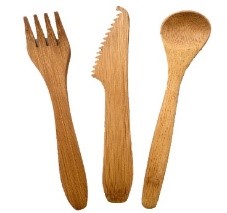
Possible public health risks through exceedance of specific migration limits
The use of bamboo and other unauthorized ground plant materials in plastic FCM may represent a public health risk as this may allow the accelerated degradation of certain plastics. This can lead to substances migrating from the plastic into food.
For example, as "bamboo"-products containing plastic FCMs are being used, the plastic degrades and melamine and formaldehyde can migrate to food in risky amounts, which exceed the safe limits (called: Specific Migration Limits) laid down in Regulation (EU) 10/2011.
Also, without compliance and documentation it is not possible to verify the origin of the materials. For instance, it may prove impossible to understand if it was new or recycled bamboo that was used for the manufacture of a given tableware.
False claims
When placed on the market, these products are often presented as ‘natural’, ‘eco-friendly’, ‘compostable’ or ‘recyclable’. These misleading false claims are meant to trick the environmentally-conscious consumers into buying something they believe to be sustainable.
This allegedly sustainable alternative to the plastic materials, however, is in fact precisely made of plastic, where the bamboo or other plant-based additive is added only as a filler (to give it volume and shape). This practice is making the plastic non-recyclable and even less eco-friendly.
In addition, these are often labelled as “organic” products. Food contact materials based on plants and not produced with the intention of being sold as food, are outside the scope of the Regulation (EC) No 834/2007 and cannot bear the EU organic logo.
When produced from organic agricultural ingredients, the products at stake can refer to organic, if this is not misleading information. The evaluation of the misleading aspect has to be done on a case by case basis and this is mainly the responsibility of the MS.
What is next?
Enforcement did not stop. The EU-coordinated action ended, and although official reporting is no longer taking place, Competent Authorities in the Member States are maintaining their vigilance and controls. The European Commission will also further assist EU countries in ensuring that these products are no longer placed on the EU market.
Food contact materials (FCMs) are any materials or articles made from plastics, paper and cardboard or any other material that come into contact with food, hot or cold, including liquids. This includes food packaging as well as kitchenware and tableware such as plates, cups, cutlery and saucepans, and everyday articles used to prepare and serve your food.
EU law requires that all FCMs need to be safe and should not affect the safety of the food nor alters its taste or smell. For plastics, all substances used to make the final plastic article must be first assessed for their safety and authorised to be used in the plastic FCM that is placed on the market in the EU.
The action aims at stopping the illegal import, trade and advertising of plastic articles sold as food contact materials, e.g. tableware, containing bamboo and other unauthorised plant-based additives. The EU-coordinated action ended in April 2022 and although official reporting is no longer taking place, Competent Authorities in the Member States are maintaining their vigilance and controls.
21 countries participated in the coordinated action, which led to a significant increase in the identification of illegal and fraudulent products. Producers, importers, and distributors were required by Member States to immediately withdraw items from the market.
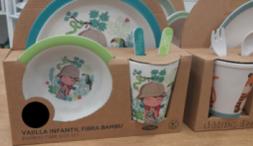
The countries involved in the action were Austria, Belgium, Czechia, Denmark, Estonia, Finland, France, Germany, Greece, Hungary, Ireland, Italy, Lithuania, Luxembourg, The Netherlands, Norway, Malta, Poland, Portugal, Slovenia and Spain
Most plant-based additives including bamboo – usually added as ground bamboo fibres – have not been assessed for their safety by the European Food Safety Authority (EFSA) and thus may present a health risk.
Many plastic FCM articles containing bamboo have suffered from accelerated degradation, which has caused leaching of formaldehyde and melamine, substances used in the manufacture of the plastic, into the food, sometimes above safe levels.
In addition, these plastics are often advertised and sold as eco-friendly and made entirely of natural plant material. This is false advertisement and misleading consumers purchasing decisions.
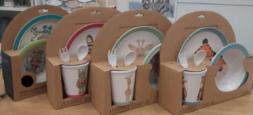
There is no acute health risk from food contact articles but continual exposure to the elevated levels of formaldehyde and melamine has the potential to cause a health concern. Recommendations on the maximum amounts of melamine and formaldehyde that can be ingested have been set that ensure the safety of consumers.
Those limits have been set taking into account also other sources of exposure, such as from the foods themselves. Ingestion of high amounts of those substances, above the health based maximum limits, may have some health effects. For example, melamine may affect the urinary tract or the kidneys.
However, the amount (several 100x) melamine and formaldehyde originating from those plastic kitchenware and tableware articles is a fraction of the total to which consumers are exposed.
Plastic food contact materials containing bamboo filler may pose a risk to human health. The laboratory analysis of a sample of coffee cups with bamboo fibres manufactured in China detected the migration of melamine at 3.5 times and of formaldehyde at 25 times above their maximum permitted level. The items were destroyed.
Member States’ authorities (food safety authorities and customs) cooperated at national and at EU level. Information was exchanged between Member States’ authorities, food safety authorities, members of the EU Food Fraud Network and the customs authorities.
During the year-long action, 748 cases of plastic food contact materials containing unauthorised bamboo powder were notified by the action participants. Of these 748 cases, 644 were products found on the EU market, while 104 were goods rejected at the EU border. 580 of the 644 products were sold (sometimes exclusively) online.
The action allowed also to detect food contact materials made of other plant-based additives, which are not authorised either in the EU. The most used was wheat, including wheat straw. Other identified additives were rice husks, maize, vegetable fibres and plant parts.
Retailers, importers and manufacturers were reminded of the law.
Through the European Consumer Organisation and other information channels, European consumers were informed about the illegality of these tableware and kitchenware articles. While such communication efforts were made during the action, it is still important to continue sensitising stakeholders and raising awareness among consumers!
When sold, these products are often advertised as ‘natural’, ‘eco-friendly’, ‘compostable’ or ‘recyclable’. These claims are false as the articles are made of plastics and mislead the consumers into buying something they believe to be natural or sustainable. Often those plastic products are not sustainable or recyclable.
Those illegal plastic products are made of a mixture of plant-based fibres/material and plastic polymers. Their feel is that of plastic (smooth, plastic surface) as indeed they are plastics. They are easy to distinguish compared to articles made entirely of plant material, such as bamboo, as the article retains the natural structure and look of the plant-material.
Illegal - Plastic FCM containing “bamboo” additive

Legal - Cutlery made of 100% bamboo
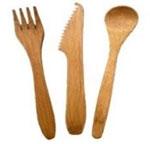
Sometimes, these plastic products are also labelled as “organic”. Even if the plant-based additive used is organic, the organic label can only be used for food under the Regulation (EC) No 834/200.
National authorities are responsible for the evaluation and control of these misleading aspects on a case-by-case basis.
It is advised to return it to the retailer or contact the platform, if bought online. If the retailer or the platform continues selling these items, consumers might consider informing their national food safety authority.
Since the product cannot be considered safe for the use for food, it is advised to not use it for food and safely dispose of it in the waste bin (as it is not compostable).
Heating the article, using it for hot foods or washing it in the dishwasher may increase the amounts of melamine and formaldehyde which migrate to the foods.
Likewise, use for infants and children who are more sensitive should be avoided.
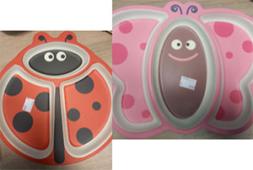
Download the Q&As in PDF format:
- 28 NOVEMBER 2022
- Downloadбългарски(724.5 KB - PDF)
- Downloadespañol(602.23 KB - PDF)
- Downloadčeština(701.25 KB - PDF)
- Downloaddansk(610.03 KB - PDF)
- DownloadDeutsch(618.79 KB - PDF)
- Downloadeesti(505.76 KB - PDF)
- Downloadελληνικά(715.12 KB - PDF)
- Downloadfrançais(631.17 KB - PDF)
- DownloadGaeilge(791.49 KB - PDF)
- Downloadhrvatski(698 KB - PDF)
- Downloaditaliano(406.36 KB - PDF)
- Downloadlatviešu(696.72 KB - PDF)
- Downloadlietuvių(697.41 KB - PDF)
- Downloadmagyar(615.52 KB - PDF)
- DownloadMalti(905.33 KB - PDF)
- DownloadNederlands(612.25 KB - PDF)
- Downloadpolski(621.72 KB - PDF)
- Downloadportuguês(525.31 KB - PDF)
- Downloadromână(691.64 KB - PDF)
- Downloadslovenčina(813.12 KB - PDF)
- Downloadslovenščina(689.55 KB - PDF)
- Downloadsuomi(601.52 KB - PDF)
- Downloadsvenska(606.95 KB - PDF)
Useful links:
- Legislation on food contact materials
- Note on the use of bamboo (see table 23 June)
- National Contact Points working on this EU Enforcement Action
- List of competent national food fraud contact points
- List of competent consumer protection authorities
- Information on resolving cross-border consumer complaints
- Scientific opinion 10.2903/J.efsa.2019.5902 adopted by EFSA on 24 October 2019: "Update of the risk assessment of 'wood flour and fibres, untreated' (FCM No 96) for use in food contact materials, and criteria for future applications of materials from plants origin as additives for plastic food contact materials"
- National actions against the illegal import and distribution of plastic food contact materials containing bamboo or other illegal vegetal additives BE / NL / LU / DE / PL
- Notifications from this action, visible in RASFF window
